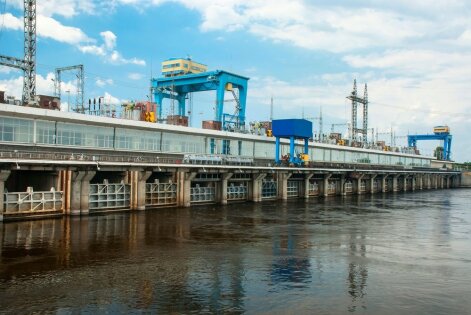Ukraine’s energy sector is poised for a disaster with pancontinental ramifications should a full-scale war start on Ukrainian territory. The potential consequences would be expected to reach far beyond Ukraine’s borders, with catastrophic humanitarian and environmental results felt across all of Europe. In the hybrid conflict that Russia has been waging with Ukraine, the effects of conventional warfare on Ukraine’s energy infrastructure remain projected, though the country has historical experiences to back up these projections. In cyberspace, the energy sector has already become the target of hacking, which Ukraine attributes to Russia-affiliated actors.
Effects of Conventional Warfare on Energy Infrastructure
Full-scale conventional warfare, involving the use of infantry, tanks, aviation, and missiles, would mean severe damage to critical ground infrastructure, including energy transport lines. For invaders, disrupting the energy supply would weaken any potential response and serve to apply psychological pressure to the government and citizens. The supply of energy resources to power stations would be interrupted, as would the supply of energy to end consumers. Energy shortages would affect water supplies and food deliveries.
That alone would be enough to precipitate a massive humanitarian crisis and an influx of migrants into Europe. But disruption of the energy supply in winter, when a move on Russia’s part seems most likely, would also affect the heating system and carry the risk of large and midsize cities freezing. To get an idea of what that would be like in Ukraine’s environment, we need only look to Alchevsk in the Donbas. In 2006, this city of 60,000 inhabitants experienced an accident at the central heating station when the temperature was −31° F (−35° C). Buildings were coated with ice outside and in, water pipes froze, and people had to survive several days in these conditions.
Nor would it be possible to protect all critical infrastructure with air defense systems—there are too many such targets to properly defend them in case of a full-scale attack. Ukraine has already seen this scenario play out in 2014–2016 when a few power stations were partially destroyed by Russian rockets. It took considerable effort to restore them to functioning status under conflict conditions. Many more stations would be destroyed in a contemporary war scenario with Russia.
Attacks on Ukraine’s hydro- and nuclear power stations would have much more severe consequences, including environmental ones. Ukraine has more than ten big hydropower and pumped storage power stations, which are connected to massive reservoirs created by damming big rivers. Should these be damaged during war, the ensuing torrential floods would destroy human settlements and infrastructure downstream. Ukraine has historical experience with this scenario as well: destruction of the strategically important DniproHES-1 dam and its plant in Zaporizhzhia by retreating Red Army forces in 1941 resulted in the deaths of as many as 100,000 civilians, who lost their lives in the tidal wave.
The results of an attack on a nuclear power plant would be orders of magnitude greater. Ukraine is among the top ten nuclear energy–producing countries in the world; it has fifteen operable nuclear power reactors with more than 13 GW of installed capacity, and two more reactors are under construction. Also, there are spent nuclear fuel storage facilities scattered across the country, and the Chernobyl nuclear power plant is still full of radioactive material after the 1986 incident. The Chernobyl disaster showed the consequences of a limited nuclear accident; one need only imagine the consequences of many such Chernobyls, each with vastly greater effects. Because some of Ukraine’s nuclear power plants are in the likely path of a potential Russian invasion, the risk of damage to these facilities is quite high, which would precipitate a global environmental disaster. Today these facilities are defended by the Ukrainian National Guard. But there is no guarantee that an invasion would not lead to an unintended catastrophe. Military mistakes happen, as in the 2014 downing of the MH-17 civilian aircraft by Russian-backed terrorists who were looking to attack a Ukrainian military plane.
Another part of the critical energy infrastructure vulnerable to attack in Ukraine is the gas transmission system. Russian gas supplies—transited through Ukrainian pipelines, Belarus, Nord Stream 1, Blue Stream, and Turk Stream—account for about half of all gas imports to the EU. The volumes arriving from Ukraine cannot be fully substituted in the event of damage to Ukrainian pipelines. Indeed, damage to Ukraine’s pipelines might prompt final German authorization of the Nord Stream 2 pipeline to cover the gas deficit in Europe, which would serve Russia’s interests. The energy situation in Europe is so critical that several voices have called for exempting energy relations from the sanctions that might be imposed on Russia should that country unleash full-scale war against Ukraine.
The Shadow War Has Already Started
Meanwhile, as Russia keeps everyone guessing whether it will attack Ukraine with conventional weapons, a shadow war has already started, in the form of cyberattacks on Ukrainian administrative IT systems and critical infrastructure. In mid-January 2022 the IT infrastructure of Ukrainian governmental bodies sustained a massive attack. Ukrainian experts suspect that Russia was behind these attacks. Among other targets, hackers have attacked the RGC energy company, which coordinates about 70 percent of Ukrainian gas distribution operators. That particular attack did not have the same number of victims as in 2016 when a cyberattack caused a blackout for 230,000 households in Ukraine. But the possibility of substantial damage through hacking remains. As well, a wave of fake bombing reports, most linked back to Russian actors and claiming schools, public transit, and various administrative bodies as targets, has taken up police investigators’ time and alarmed civilians. All this puts psychological pressure on Ukrainian society and erodes any sense of security.
Ukraine’s security is Europe’s security. An attack on Ukraine is an attack on all of Europe. This is why the European states should work together to prevent Russia from launching a full-scale war and to help Ukraine resist if one does start.
